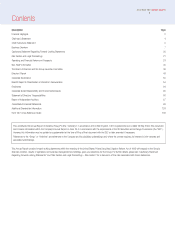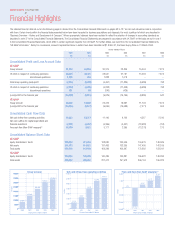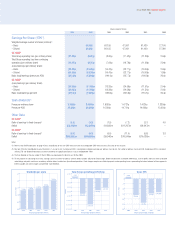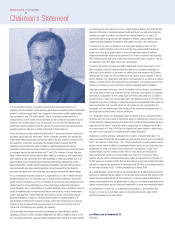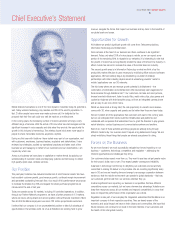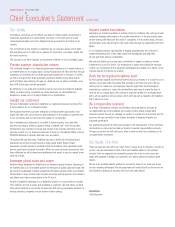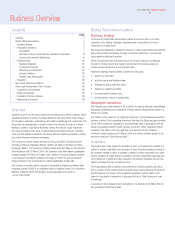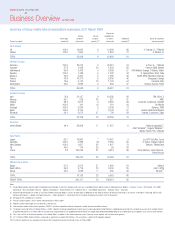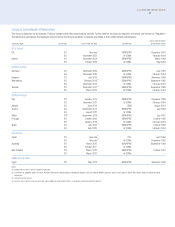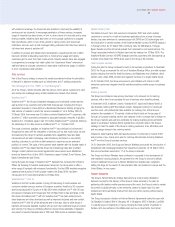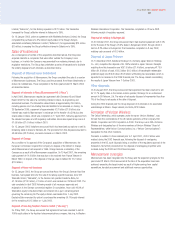Vodafone 2004 Annual Report Download - page 13
Download and view the complete annual report
Please find page 13 of the 2004 Vodafone annual report below. You can navigate through the pages in the report by either clicking on the pages listed below, or by using the keyword search tool below to find specific information within the annual report.
Annual Report 2004 Vodafone Group Plc
11
with enhanced coverage, the Group has also invested in improving the usability of
services such as voicemail, to encourage penetration of these services. Increased
usage of voicemail has been shown, in turn, to drive volume of voice calls and is a key
revenue enabler. Initiatives have also been run to encourage customers to populate
their phonebooks, which in turn drives growth in calling circles, and missed call
notification services, such as text messages telling customers that they have missed a
call when their phone is switched off.
In addition to product and infrastructure development, a significant amount of effort
has been directed at educating customers in mobile phone usage and helping
customers get the most from their mobile phone. Several markets have also engaged
in programmes to redesign their retail outlets into “Experience Stores”where store
staff are trained to educate customers in responsible mobile phone usage, in addition
to more conventional retail activities.
Data services
Part of the Group’s strategy to expand its market boundaries involves the stimulation
of demand in adjacent markets such as infotainment and IT wireless productivity.
Short Messaging Service (“SMS”or “Text Messaging”)
All of the Group’s mobile networks offer this service, which allows customers to send
and receive text messages using mobile handsets and various other devices.
Vodafone live!™
Vodafone live!™, the Group’s integrated messaging and multimedia content service,
was launched in six countries during the 2004 financial year, including the Group’s
associated networks in France (SFR) and Switzerland (Swisscom Mobile), bringing the
total number of markets in which the service is available to 16 at 25 May 2004. At
31 March 2004, there were over 6.8 million controlled Vodafone live!™ customers, with
a further 0.7 million customers connected to associated company networks. In addition,
Vodafone K.K. (“Vodafone Japan”) had 13.0 million Vodafone live!™ customers following
the rebranding of its J-Sky service to Vodafone live!™ on 1 October 2003.
The range of services available on Vodafone live!™ has continued to be improved
throughout the year, with the integration of services such as real music tones, as well
as broadening the range of handsets available. New capabilities have also been
introduced such as video messaging, video streaming and Search, a new facility
enabling customers to use their mobile handsets to search across an extensive
portfolio of content. The scale of the customer base together with the broader reach of
Vodafone live!™ has meant that the Group has increasingly been able to attract
stronger content partners and recent agreements have involved such established
brands as Warner Bros. Online, UEFA Champions League Football, Sony Pictures, Sony
Music Entertainment and Disney.
During the year, the range of Vodafone live!™ handsets has increased from three to
fifteen. By focusing its handset development resources, the Group aims to offer a
wider range of handsets with enhanced functionality. The first GSM-enabled megapixel
camera phone launched in the European market, the Sharp GX30, had been
introduced into 10 controlled markets by 25 May 2004.
Vodafone live!™ with 3G
Vodafone is the first mobile operator to bring 3G technology to both business and
consumer markets across a number of European countries. Vodafone’s 3G consumer
service was launched in Europe on 4 May 2004 when Vodafone live!™ with 3G was
introduced in Germany and Portugal and from 25 May 2004 in Italy and Spain. In the
first phase of Vodafone live!™ with 3G, Vodafone live!™ has been enhanced with
video telephony and video downloads as well as improved ringtones and new content.
Vodafone live!™ with 3G will be enhanced later in the year, when a wider range of
handsets will become available, together with an even more extensive range of content
and services. The Group is prioritising efforts to ensure timely availability of handsets
and plans for handset deliveries later in 2004 and 2005 are at an advanced stage.
Mobile Connect Card
The Mobile Connect Card, first launched in November 2002 and which enables
customers to connect to e-mail and business applications from a range of access
devices, has been enhanced to operate across both GPRS and 3G technologies with
the introduction in certain markets of the Vodafone Mobile Connect 3G/GPRS datacard
in February 2004. By 31 March 2004, Germany, Italy, the Netherlands, Portugal,
Spain, Sweden and the UK had all opened their networks for commercial service. The
Group’s associated network in Belgium launched the datacard on 13 May 2004. The
Vodafone Mobile Connect 3G/GPRS datacard provides customers with data speeds up
to seven times faster than GPRS when used on the Group’s 3G networks.
Other business services
During the year the Group continued to build on its business propositions. In November
2003, the Group commenced the roll-out of Vodafone Wireless Office, a mobile handset
solution reducing the need for fixed line phones, and Blackberry from Vodafone, which
delivers voice, email, SMS, browser and organiser functions in a single mobile device.
On 22 October 2003, the Group announced a joint initiative with Oracle to offer
enterprise customers integrated mobility solutions enabling mobile access to business
systems.
Roaming services
The Group has introduced new pricing structures in its networks for its roaming
services, with a view to encouraging the use of services when travelling abroad.
In November 2003, Vodafone Limited (“Vodafone UK”) launched Vodafone World, a
new branded roaming tariff that delivers simple, transparent pricing for roaming all
over the world, with preferential rates available for roaming onto all the Group’s
networks. Now available in 13 markets, Vodafone World builds on the success of
Eurocall, a European roaming service, and replaces it with a concept that is relevant to
the Group’s markets and partners worldwide. By making roaming prices worldwide
easier to understand, Vodafone World represents an important step in the Group’s
strategy to meet the needs of the Group’s roaming customers at an affordable price
and encourage change in the roaming market.
Vodafone’s Data Roaming Tariff was launched across 10 networks in October 2003
and provides a new, simple price plan for roaming data services including Vodafone
live!™ and the Group’s business services.
On 22 December 2003, the Group and Verizon Wireless announced the introduction of
transatlantic text messaging between their respective customers. By 31 March 2004,
this service had been launched in 11 of the Group’s networks.
The Group and Verizon Wireless have continued to cooperate in the development of
inter-standard roaming products. An agreement for the Group to licence its Mobile
Connect dashboard know-how to Verizon Wireless has recently been completed,
setting the stage for the launch of inter-standard data card products in Europe and the
United States, in due course.
Partner Networks
The Group’s Partner Network strategy has become a more broadly established
business concept for the delivery of the Group’s mobile services in the year. By
partnering with leading mobile operators around the world, the Group is able to market
its portfolio of global services in new territories, extend its brand reach into new
markets and derive additional revenue from fees and visitor roaming without buying
equity stakes.
The Group has signed a further six Partner Network Agreements during the year with
Og Fjarskipti in Iceland, Bite in Lithuania, M1 in Singapore, MTC in Bahrain, LuxGSM
in Luxembourg and Cytamobile in Cyprus, bringing the total number of partners to
thirteen. With two partners in the Middle East and one in Asia Pacific, the Partner


